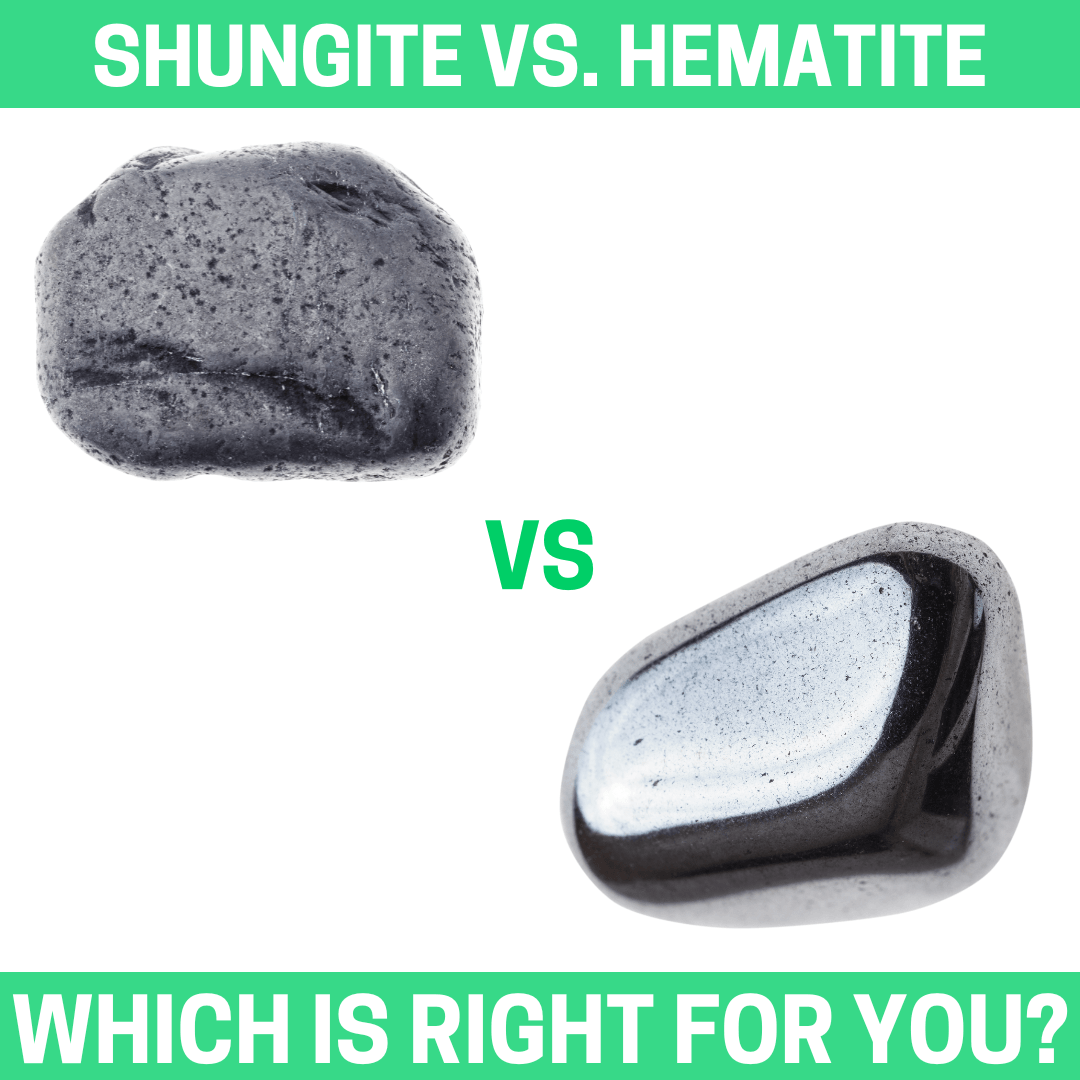Shungite is well known within the wellness world for its many benefits for people, but what about the benefits of shungite for plants?
What is Shungite?
Shungite is a unique and rare mineral that is found primarily in Russia. It is known for its natural healing properties and has been used for centuries to promote overall well-being.
Shungite is composed mainly of carbon and contains trace amounts of minerals such as quartz and pyrite. It is believed to have powerful antioxidant and antibacterial properties, making it beneficial for various applications.
Shungite has gained popularity in recent years for its use in water purification, as it is said to filter out harmful chemicals and impurities.
Additionally, shungite is also used in agriculture, particularly in the growth and development of plants.
It is said to enhance the resistance and tolerance of plants to abiotic stresses, improve soil fertility, and promote the overall health and yield of crops.
With its many potential benefits, shungite is becoming increasingly recognized as a natural and effective solution for various uses.
Benefits of Shungite for Plants
Shungite, a unique mineral found in Russia, offers a plethora of benefits for plants.
Its presence in the soil can greatly enhance plant growth and development.
One of the key advantages of using shungite in gardening is its ability to lower soil acidity levels.
This is particularly beneficial for plants, as it creates an optimal pH balance in the soil, which is essential for nutrient absorption.
Furthermore, shungite has excellent water retention properties.
It helps plants to retain moisture in the soil, even during periods of drought or water scarcity.
This characteristic is especially valuable in ensuring the resistance of plants to abiotic stressors, such as soil water deficit or extreme temperature changes.
Additionally, shungite serves as a natural regulator of the soil's thermal regime.
It helps to create optimal conditions for plant growth by maintaining stable temperatures in the soil.
Lastly, shungite acts as an additional source of carbon dioxide. Plants require carbon dioxide for photosynthesis, which is crucial for their growth and development.
By releasing carbon dioxide into the soil, shungite supports the plant's metabolic processes and promotes their overall well-being.
Using shungite in gardening provides numerous benefits for plants. It helps to lower soil acidity, retain moisture, regulate the thermal regime, and acts as an additional source of carbon dioxide.
Incorporating shungite stones into soil or adding shungite water can significantly enhance plant growth, increase yield, and accelerate seed germination.
Plant Growth

Plant growth is a fascinating and complex process that is influenced by various factors, including the soil composition and environmental conditions.
One such factor that has gained attention in recent years is the use of shungite as a natural aid in promoting plant growth.
Shungite, a unique carbon mineral found in Russia, has shown significant potential in improving the growth and development of plants.
Its water retention properties help plants withstand drought and water scarcity, while its ability to regulate the soil's thermal regime creates optimal conditions for plant growth.
In addition, shungite acts as an additional source of carbon dioxide, supporting the plant's metabolic processes and promoting overall well-being.
With its natural properties and low-cost benefits, shungite is emerging as a perfect solution for enhancing plant growth and ensuring a rich harvest.
How Does Shungite Affect the Growth of Plants?
Shungite, a unique natural carbon material, has shown positive effects on plant growth and development.
Its ability to lower soil acidity and retain moisture makes it beneficial for plants.
By reducing soil acidity, shungite creates a favorable environment for plants to thrive.
Moreover, it helps in moisture retention, ensuring a consistent water supply to plant roots and preventing soil water deficit.
Another way shungite affects plant growth is by regulating the thermal regime of the soil. It acts as a thermal insulator, protecting plants' roots from temperature extremes.
This helps create optimal conditions for plant growth and increases their resistance to abiotic stress.
Furthermore, shungite serves as an additional source of carbon dioxide for photosynthesis. As plants require carbon dioxide for their growth, the presence of shungite in the soil provides an easily accessible and low-cost natural carbon material.
How to Use Shungite With Plants
To utilize shungite's benefits, it can be applied to the soil and root area as stones or powder. Additionally, water infused with shungite can be used for watering and soaking seeds.
These methods ensure that the plants receive the desired amount of shungite and maximize its positive effects on growth and development.
Overall, shungite's ability to lower soil acidity, retain moisture, regulate the thermal regime, and serve as an additional source of carbon dioxide makes it a perfect solution for promoting plant growth and achieving a rich harvest.
Square Meter Studies on Shungite and Plant Growth
In square meter studies conducted to assess the impact of shungite on plant growth, researchers employed a rigorous methodology to measure the effects of this unique mineral.
These studies involved selecting a specific area of land, typically one square meter in size, and cultivating various plants under controlled conditions.
The methodology involved dividing the selected area into two sections: one treated with shungite and the other untreated as a control. Shungite stones or powder were applied to the soil in the treatment area, ensuring the plants received an adequate amount of shungite. The researchers then monitored the growth and development of the plants over a specific period.
The findings of these studies indicated that the inclusion of shungite in the soil had a significant positive impact on plant growth.
Specific plants, such as cucumber plants and onion seedlings, displayed notable benefits when treated with shungite.
These included increased tolerance to abiotic stress, higher resistance to thermal regime fluctuations, improved mineral composition, enhanced physiological responses, and reduced oxidative damage.
Overall, square meter studies have demonstrated the effectiveness of shungite in promoting plant growth and development.
The inclusion of shungite as a natural carbon material and its ability to regulate the thermal regime of the soil contribute to the observed benefits.
By optimizing conditions for plant growth and serving as an additional source of carbon dioxide, shungite proves to be a perfect solution for enhancing plant growth and obtaining a rich harvest.
Shungite Stones and Water
Shungite, a unique carbon-based mineral found only in Russia, has gained attention for its potential benefits in various applications. One area of interest is its relationship with plant growth.
Shungite stones or powder, when applied to the soil, can profoundly impact plant development.
When included in the soil, shungite provides plants with essential nutrients and acts as a catalyst for improved growth.
Moreover, shungite-treated plants have shown increased resistance to abiotic stress factors, such as thermal regime fluctuations and soil water deficits.This makes it an excellent solution for optimizing plant growth and productivity.
The inclusion of shungite in the soil has been found to enhance mineral composition, improve physiological responses, and reduce oxidative damage in plants.
By harnessing the power of shungite, growers can create a more conducive environment for plant growth and potentially achieve higher crop yields.
How Could Shungite Impact Agriculture?

The incomparable properties of the Shungite stone make it an incredible aid in promoting plant growth.
When applied in gardens or agricultural soils, the Shungite stone has a remarkable impact on plants owing to its ability to lower soil acidity and retain moisture.
Firstly, the Shungite stone serves as a natural pH regulator, reducing the soil's acidity levels. By doing so, it creates an optimal environment for the development of plants, allowing them to thrive and reach their maximum potential.
Secondly, one of the significant benefits of the Shungite stone is its unique capacity to retain moisture in the soil. This characteristic helps to create a balanced soil water regime, ensuring that the plants receive adequate hydration even in arid conditions.
Furthermore, the Shungite stone acts as a thermal regulator, maintaining the optimal temperature for plant growth. This feature is particularly beneficial for greenhouse cultivation, as it allows for consistent and controlled crop development.
Lastly, the Shungite stone acts as an additional source of carbon dioxide, which is essential for plants during the process of photosynthesis. This enables the plants to produce more energy and nutrients, ultimately leading to improved growth and development.
How Does the Application of Shungite Water Affect Plant Growth?

Shungite water has several effects on plant growth, making it a valuable resource for gardeners and farmers. Firstly, applying shungite water helps regulate soil acidity, creating a more suitable environment for plant development.
By reducing acidity levels, the shungite water promotes optimal nutrient absorption, leading to healthier and more vibrant plants.
Furthermore, shungite water aids in moisture retention, ensuring that plants have a balanced soil water regime. This becomes especially beneficial during dry periods when plants often suffer from water deficit.
By using shungite water, gardeners can reduce the need for frequent irrigation, as the moisture-retaining properties of shungite help plants thrive even in arid conditions.
Shungite also plays a role in stabilizing the thermal regime of the soil. It acts as a thermal regulator, maintaining optimal temperatures for plant growth. This is particularly advantageous in greenhouse cultivation, where maintaining consistent and controlled conditions is crucial for optimal plant development.
Additionally, shungite water acts as a source of carbon dioxide, essential for the process of photosynthesis. Increased carbon dioxide levels help plants produce more energy and nutrients, resulting in higher yields and a more bountiful harvest.
These benefits contribute to healthier, more resilient plants and higher yields for gardeners and farmers.
Shungite Powder and Its Effects On Plants

Shungite powder, derived from the unique shungite stone, has gained popularity among gardeners and plant enthusiasts due to its positive effects on plant growth and development.
Rich in carbon-based compounds, shungite powder offers numerous benefits when applied to plants, including enhanced soil fertility, improved resistance to abiotic stress, and increased antioxidant activity.
By incorporating shungite powder into their gardening practices, individuals can harness the power of this low-cost natural carbon material to promote the well-being and productivity of their plants.
Whether used in indoor or outdoor settings, shungite powder provides a perfect solution for nurturing and optimizing plant growth, proving to be a valuable addition to any gardening toolkit.
What Are the Effects of Applying a Shungite Powder to Plants?

Applying shungite powder to plants has been found to have several positive effects on their growth and development.
Shungite, a unique mineral with high carbon content, acts as a natural carbon material when used in agriculture. This makes it a low-cost and environmentally friendly alternative for enhancing plant growth.
Shungite powder aids in improving soil fertility by providing essential nutrients to plants.
It also enhances antioxidant activity, protecting plants from oxidative damage and improving their overall health.
Shungite-treated plants have shown increased resistance to abiotic stresses such as soil water deficit and thermal regime, making them more tolerant in challenging conditions.
However, it is important to note that the effects of shungite powder may vary depending on the plant species and the environmental conditions.
In some cases, excessive application of shungite powder may have detrimental effects, so it is crucial to use it in appropriate amounts.
Notably, shungite powder can also serve as an additional source of carbon dioxide for photosynthesis, contributing to the growth and development of plants. Its unique physical characteristics make it a perfect solution for enhancing plant regeneration medium composition.
What Are the Pros and Cons Of Using Shungite Powder?

Shungite powder offers several benefits when used in plant growth. Firstly, it stabilizes the mineral composition of the soil, providing essential nutrients for plant development. This enhances plant growth and ensures a rich harvest.
Secondly, shungite powder regulates temperature and humidity levels in the soil, creating optimal conditions for plant growth.
Shungite also has the ability to adsorb dangerous chemicals and pesticides from the soil, promoting a healthier environment for plants.
However, there are some potential drawbacks to consider when using shungite powder.
Proper dosage is crucial since excessive application can have negative effects on plant growth.
It is important to follow recommended guidelines to ensure optimal results. Moreover, interactions with other fertilizers or treatments should be considered to prevent any potential conflicts.
Dangerous Chemicals in Plants

When it comes to plant health and growth, it is essential to be aware of the potential dangers associated with chemicals. While there are numerous benefits to using fertilizers and treatments, it is necessary to exercise caution as certain chemicals have the potential to harm plants.
One of the benefits of adding shungite to the soil of your plants or watering your plants using shungite is its ability to absorb toxins and chemicals.
While the use of chemicals is not ideal, adding shungite to your plants can help to minimize any negative impact from those chemicals.
What Are Some Common Chemicals Found in Indoor Plants That Can Be Harmful To Humans or Animals?

Indoor plants can bring beauty and fresh air into our homes, but it's important to be aware that some common chemicals found in these plants can be harmful to both humans and animals.
Certain indoor plants have been found to release volatile organic compounds (VOCs), which can have negative health effects when inhaled.
One of the most common VOCs released by indoor plants is formaldehyde. This chemical is known to irritate the eyes, nose, and throat, and prolonged exposure can even cause respiratory problems.
Benzene, another VOC, has been linked to an increased risk of certain types of cancer.
Toluene and xylene are two other VOCs that can cause headaches, dizziness, and nausea.
Exposure to these chemicals can have various health issues, ranging from mild discomfort to more serious respiratory and cancer-related problems.
It's especially important to consider the potential risks if you have pets or young children in your home, as they can be more susceptible to the harmful effects.
While indoor plants offer numerous benefits, it's crucial to choose plant varieties that release lower levels of VOCs.
Good options include snake plants, spider plants, and peace lilies, as they have been found to have a lower potential for chemical emission.
Additionally, ensuring proper ventilation in your home and regularly monitoring the health of your indoor plants can help mitigate any potential risks.
Resistance of Plants to Stressful Environments

Cucumber plants are well known for their sensitivity to abiotic stress, including water deficit in the soil. However, recent experiments have demonstrated the potential of shungite, a unique carbon material, to enhance the resistance of plants to such stressful environments.
In one study, cucumber plants were treated with shungite water, which had been prepared by immersing shungite stones into water for a certain period. The plants were then subjected to conditions of soil water deficit, simulating drought stress.
Remarkably, the shungite-treated cucumber plants exhibited improved tolerance compared to the untreated plants.
Physiological changes were observed in the shungite-treated plants under drought stress conditions.
Measurements of antioxidant activity indicated that the shungite-treated plants had higher levels of antioxidants, which help plants mitigate the harmful effects of reactive oxygen species.
Additionally, the shungite-treated plants displayed enhanced physiological traits, such as increased leaf water potential and stomatal conductance, suggesting better water use efficiency.
These findings highlight the positive effects of shungite on the tolerance and development of cucumber plants.
By enhancing the plants' resistance to abiotic stress, shungite offers a potential solution for improving crop yield in challenging environments.
Further research is needed to fully understand the mechanisms involved and optimize the applications of shungite in agriculture.









